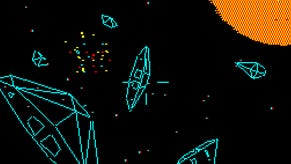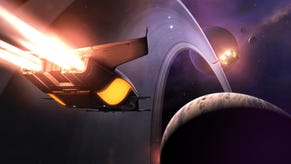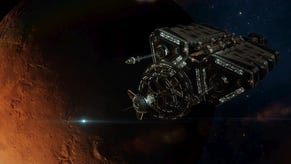Elite: Dangerous Seeks Out New Exploration Features
To boldly beta where no beta...
Elite: Dangerous has a continuing mission: to be regularly updated with new features until it's a robust space sim. Right now the purchasable beta includes 55 star systems to visit, some trading to trade, some combat to combat, but there's a lot that's still to come. Including, hey, around 100 billion more star systems. For all that new space terrain to mean anything though, there needs to be a set of mechanics in place which make exploration fun and rewarding. Features aiming to do just have been explained in the latest newsletter, and I've picked out the salient details below.
Firstly, exploration is about more than just visiting a location:
So, true system exploration is a bigger deal than just visiting that system. Players must scan it to determine what number and sizes of planets are present, and to get the next level of data they must travel to at least the vicinity of each body to investigate. A system will only be ‘partially explored’ until all major bodies (planets and moons within a certain distance of the central star(s)) have been scanned by someone and the data returned home. There are different levels of scanning, both passive and active, that can be done from orbit, to determine basic planet types, their chemical composition, mineral deposits, surface liquids, interesting anomalies, and even indications of the presence of indigenous life.
Scanning is dangerous, as the power consumption required to use the tools alerts any nearby ships to your location and may draw enemies towards you. The risk is worth it because, armed with any scanned data, you can return to a "data claim registration facility" and log the data to earn money. The amount you earn will depend on the type of planet you've scanned:
Discovering a world with indigenous life is incredibly valuable, but even scanning seemingly worthless moons has value – both for completeness of maps (verifying there isn’t something there is still useful), but very rarely, something interesting may be there after all – maybe even a strange artefact. A wise explorer will buy the latest such data before leaving – to see which systems have been explored first, so as not to duplicate the efforts of others.
Federation and Empire factions don't share information with each other, which means both sides will need to buy and sell data in order to advance their knowledge of the galaxy. That also means that there's competition between players for who can be the first to scan and sell their data, as it'll be worthless should someone else do it before you.
Which all sounds exciting and lovely and I really need to get back to playing the game. The newsletter also included this 4K screenshot for those who like giant space stations. And who doesn't?
There's no word on when these mechanics will be added to the game, though there's promise of more detail in future newsletters. For now, check out Alec's interview with David Braben and his nostalgia prompted by playing the game with a joystick.









